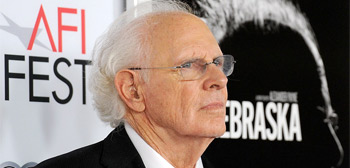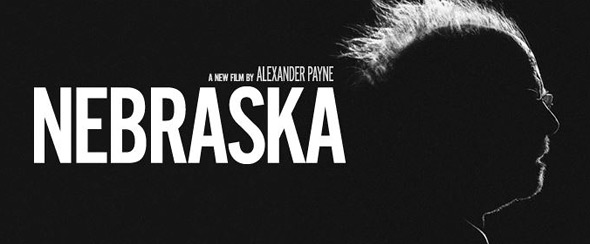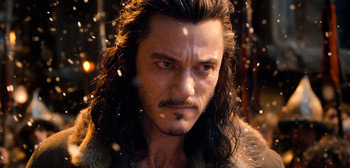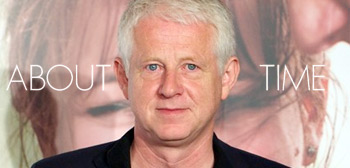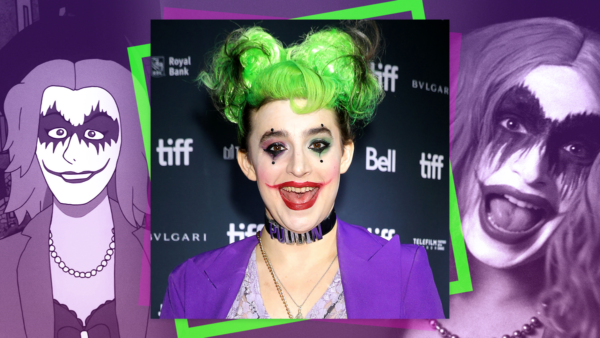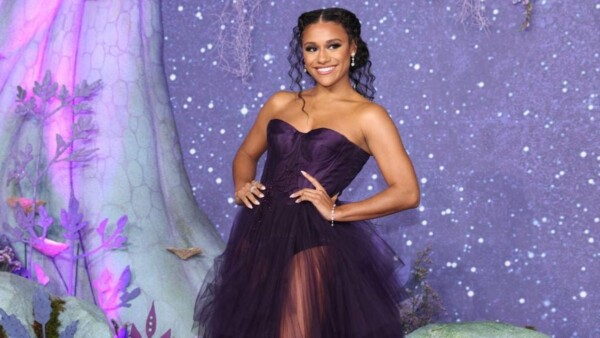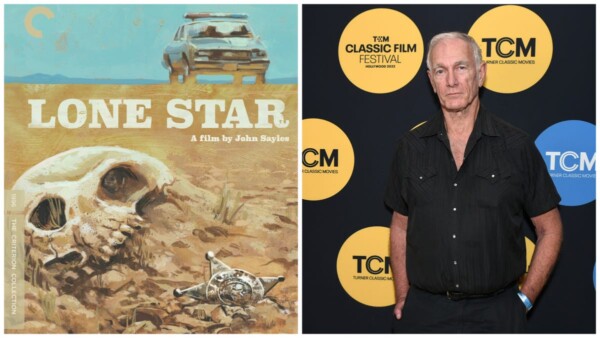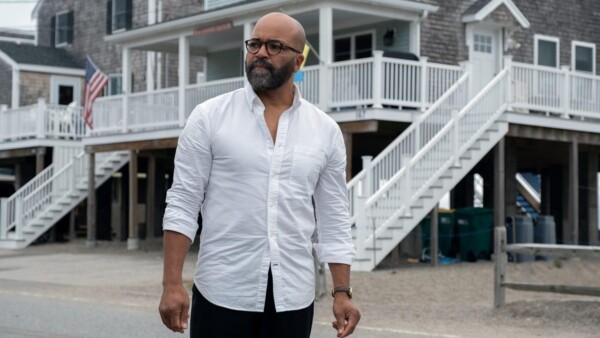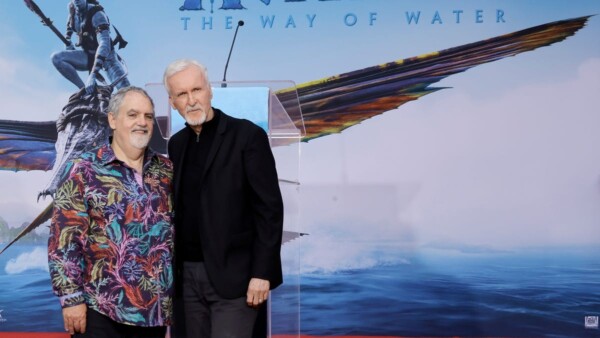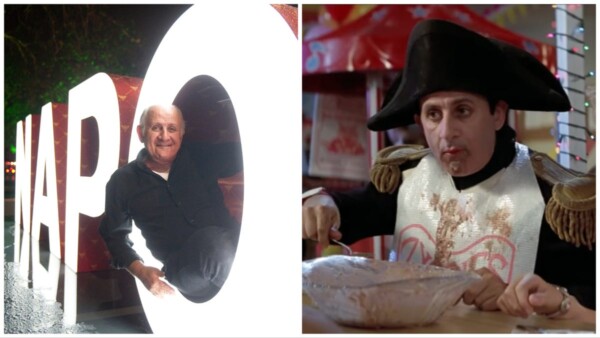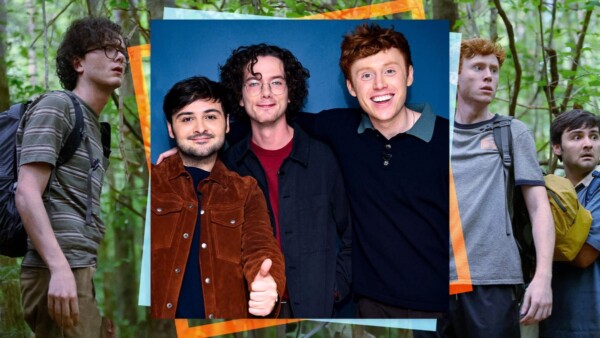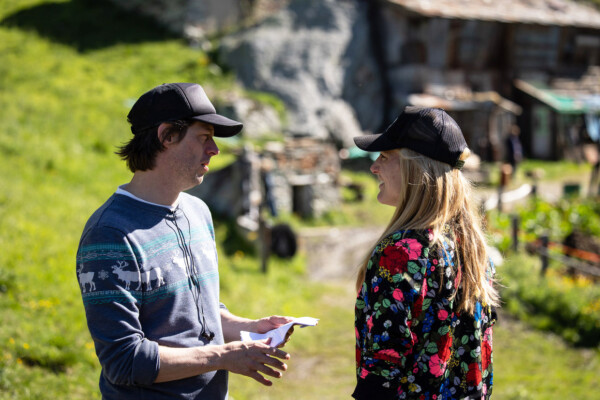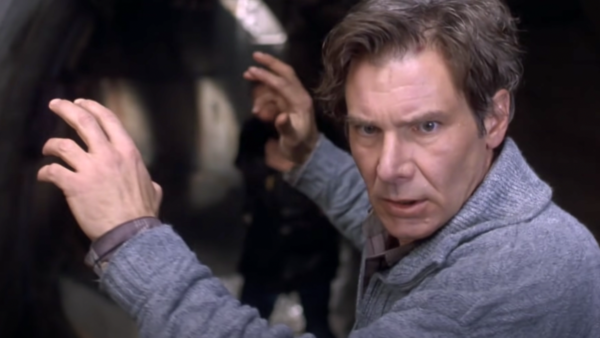Interview: Bruce Dern Talks the Art of Acting and Payne’s ‘Nebraska’
by Joey Magidson
November 15, 2013
I always enjoy getting to talk to members of this industry, specifically the rare times when a veteran actor is made available, but every so often you just get blown away by someone. It doesn’t happen too often, but last week it happened when I got the chance to speak to Bruce Dern at Paramount’s offices in New York City. Obviously, the interview opportunity came about because of Nebraska, which begins its theatrical run this week, but honestly, wouldn’t you use any excuse to talk to a legend like Dern? The man didn’t disappoint, as he told some incredible stories (including a few about Alfred Hitchcock!), and paid me a rather stunning compliment. All-in-all it’s one of the best interviews and most memorable film-related moments of my life.
As I wrote about recently in an awards editorial here, Alexander Payne’s Nebraska is in the midst of a very targeted awards campaign, so it’s no secret why this interview was available to me, but still, I know I had an amazing time talking with Mr. Dern and I think he enjoyed himself, too. You obviously can’t hear him while reading the following transcript, but he has such a hypnotic voice, I found myself just so drawn to what he was saying. I’m gushing, but hey, the man can do that to you. He is a legend. Now without further adieu, here’s the full transcript of my chat with a man who needs no introduction… the man, the myth: Bruce Dern!
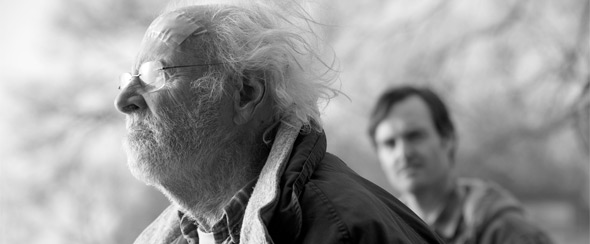
Bruce Dern: Nice to meet you, sir.
The pleasure is all mine.
(At this point Dern began eating a sandwich, so we made a bit of small talk about the iPad that I was recording the interview on and how I’d gotten it originally as a gift for when I was inducted into the Police Academy during the few days that I was a member of the NYPD. He was rather taken by that story, but as he finished his sandwich he wanted to make sure I wasn’t just waiting while he ate. So we continued…)
Dern: Fire away.
Alright. So I saw the movie at the New York Film Festival and enjoyed it.
Dern: Thank you.
I remember reading about the lead up to the film getting made, how Alexander [Payne] had wanted to make it for a while, but put it on the backburner at first…
Dern: A decade!
For a long time, it had been his «next» movie, and in the age of the internet you can follow along in this way that you never could before. It used to be that you found out someone was shooting a movie when shooting actually begun, now you can see how someone like Scorsese has a dozen projects he’s juggling as he decides what to do next. Of course that leads to people asking why he’s not making a certain film, and Nebraska was that one for Payne.
Dern: That’s exactly the psychology I went through. You’re in my heart and in my brain.
Eventually, you get to casting, which for this film you heard how he might potentially look at Jack Nicholson again or convince Gene Hackman to act again…
Dern: I knew two people who Alexander wanted for the movie. One was dead… Henry Fonda.
That’s hard to do!
Dern: He wanted Henry Fonda. The other was—he wanted to run it by Gene Hackman. The other names were, excuse the expression, «blogger’s interpretation of the vibe on the street».
Oh yeah. The sort of thing where people go «he’s worked with Jack Nicholson before, how many other actors of that age are around» and so on…
Dern: For me? A lot! [laughs]
I bet!
Dern: You keep thinking where’s Duvall? Where’s Clint? Where’s Redford?
Clint was busy at the Republican Convention.
Dern: [laughs] You know…
Yes, but then we saw your name and everyone went «well that’s an interesting decision». Especially when you got paired with Will [Forte], the buzz was about how unusual the casting was and how specific a vision Alexander must have, which bodes well for the movie.
Dern: But then you hear how disappointed everyone was when they picked us!
I’m always fascinated by that though, when a director goes against the, I guess, easier choice, and casts exactly who he wants regardless of other factors.
Dern: Well he’ll tell you, 80% of his job is casting and once he gets the characters, the wonderful thing for you, if you’re lucky enough to be chosen is… you’re Woody. And he knows that, and you know that, so relax. Don’t try to prove anything to him, just be the character. You know, the first day of shooting he told me «don’t show Phedon [Papamichael, the Director of Photography] anything. Let us find it». And then I knew, boy, I have a partner, I have a friend. I have two guys who are going to be there, I don’t need to raise my hand higher in anything, I just need to be. I don’t need to communicate that I’m working as an actor so people can see the work and such, no. I’ve always spent my career trying not to show the work, trying to be a real a real person, and this movie, well Alexander’s movies are all kind of like that, but in this movie we got a feeling of the collective from the beginning, that everyone had to pull their own oar. It was all on the page, I mean Bob Nelson wrote a great script. I mean, there’s nothing I added and I’m very famous for «Dernsies» and all that crap that I do. If I’d have done that in this movie, it would have ruined it.
If we’d have picked someone other than Will, the great thing about Will to me, is he sacrificed a familiarity with a certain way of working, that he’d become very well known for and threw that under the bus to fit in and make the movie work, by being something that he’d never been asked to do. Well, you put him with a guy who has the same situation, I’m quick, I’m this, I’m explosive, all the roles I’ve played have been lynchpin sort of roles, the picture turns one way or another, this one, that’s not the case. I have to pull my oar in my area, then you introduce June [Squibb] into the equation, and Alexander had a history with her because of About Schmidt.
You know, when I first met him, she was the first person he’d cast, but then he asked me «what about your son?» and I didn’t know. I hadn’t thought about it, I didn’t know who those guys were, you knew them a hell of a lot better than I did. I said I was impressed by one person. Alexander asked who, and I said that I’d seen a movie Sean Penn did called The Indian Runner and Viggo Mortensen was in it. I’d never seen him in anything else but he impressed me. Jason Patric will always impress me too. I did a movie with him called After Dark My Sweet and his performance in that, though he’d done Lost Boys before that, it was about as good of a first performance as I’ve ever seen. So other than that, I didn’t know. A year and a half later though, when I got the role, he said «well, what do you think of Will Forte?» Well bud, I didn’t know who Will Forte was, and I’d hosted a couple of Saturday Night Lives, but never in his era, that was back when there were covered wagons when I did mine, so I looked at a couple of things and asked a couple of questions about him. He has the same thing that Alexander has… their approachability is fabulous.
Agreed, I actually spoke to him earlier.
Dern: Oh, you did?
Indeed, and it was a lot of fun, though I was a bit nervous. Honestly, I was nervous about this one too since I’ve seen your work for a long time. Actually, one of the first «adult» books I read as a pre-teen was Black Sunday, and then when I found there was a movie… there you were. Obviously I saw Coming Home a little later.
Dern: Ah!
And with Will, I’d seen him on Saturday Night Live, but what struck me about him was when I walked in earlier he was so quick to say hi, without even knowing that I was here to interview him. He just wanted to chat.
Dern: Well, Alexander is the same way. You could walk in, with him not knowing you were a journalist, and he’d go «come on, take a look at this shot, come see what we’re doing».
I saw how friendly all of you were a couple of weeks ago at an event during the New York Film Festival…
(At this point, Will Forte actually walked in to say hello to Dern quickly.)
Hey, there he is!
Dern: How are you?
Will Forte: Oh my God, I just wanted to say bye and I’ll see you in a couple of hours!
(He then gave Dern a hug before spotting me and giving me one too, which was very nice of him.)
Forte: Nice seeing you Joey.
Pleasure.
Dern: Will, he wanted to be a cop.
Forte: What?
I didn’t tell you that. Lasted for three days, that’s how I got the iPad.
Forte: Oh my God, that’s awesome.
Dern: You know what, is that a movie or what?
Forte: That’s pretty great.
Dern: The Three Day Cop! [everyone laughs]
Forte: Sorry to interrupt!
No worries, believe me. A pleasure.
Dern: He’s the nicest man I’ve met in my career.
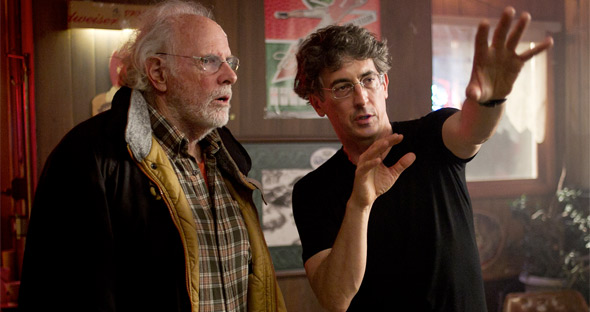
I’ve been pretty lucky so far. Granted, you don’t go in expecting anything to go wrong, but part of me always thinks I’m going to be the one who sets someone off. Basically, I assume you’ve heard every question I could ask ten times before, so there’s nothing original for me to say, so I’d rather just chat and not have those seven questions I need to ask or something like that. For me, it’s just more interesting to chat, and with Will, it was just a conversation.
Dern: That’s how it is. We love that.
I appreciated Will’s kindness, that’s for sure.
Dern: It’s an approachability, and outside of Alexander, the most approachable director that I ever worked with Mr. Hitchcock, because I put my chair next to his and said I was going to sit there for ten weeks and watch, so if you don’t like it tell me now. You know, he was so big he couldn’t turn to look at you when you were sitting next to him, so our whole two and a half months was him facing one way. Basically he would say (he now does a Hitchcock voice) «that would be fine Bruce. In my office, I have 1240 perfect frames on the wall, but none of them are entertaining, so that’s why you’re here. Because we never know what you might do next… and Mr. Peckinpah wanted a million dollars and Hitch doesn’t pay a million dollars. And Bruce, our widows should have their names spelled phonetically.»
That’s amazing. There’s something about getting to hear those stories. You know, because I’m younger I don’t get to hear them as much for one reason or another. You know, you mentioned the movie The Indian Runner…
Dern: You know who else is very good in that movie? David Morse.
Yes!
Dern: And Sean’s ex-wife, she’s always good.
That was a movie, I think I was 18 when I saw it, because I’m a big Bruce Springsteen fan. Once I heard that his song Highway Patrolman had inspired it, I went right out to get it, saw it, and loved it. It’s a movie that seven people may have seen, but it’s amazing.
Dern: Who cares? You make them whether people see them or not.
One of my favorite things about doing what I do is to try and get more than seven people to see something little that deserves a wider audience. There’s a movie called Red State that came out a couple of years ago from Kevin Smith and he cast Michael Parks in it, in a lead role, which you never get to see, and he just owns the screen…
Dern: I began with Michael Parks. Both Jack [Nicholson] and I felt that he was going to be the guy from our generation that was going to be the big movie star.
When Kevin Smith tells the story of seeing him in From Dusk Till Dawn about 15 years ago or something like that, he just knew he had to work with him.
Dern: What about Bus Riley’s Back in Town? Now that’s 50 years ago…
Sure, and also Then Came Bronson, too.
Dern: I did a Then Came Bronson.
Wow. I’m dying to get that show on DVD. Once you see one Michael Parks performance…
Dern: Alexander saw Michael Parks for this.
Really?
Dern: And also, if Jack hadn’t been willing to do the movie, he would have been the other brother in The King of Marvin Gardens.
That’s amazing, and another fantastic film. It’s interesting to see who’s still working years later as opposed to who’s not, for whatever reason. It’s I think to the detriment of film overall that it took until Alexander Payne thought of you for a performance like this to come your way. I mean, it’s not like you haven’t been working…
Dern: That’s why the big win for me and for Will, and I hope June would say the same, the big win is, it’s nice to get the accolades, but the big victory is getting the role. For this movie, or whatever movie has moved you in some way. This is a big one for Will, Silent Running was the first big one for me, because somebody said—well, Doug Trumbull—that I was actually 17th choice for that part. I was in the car with Doug Trumbull and Mike Gruskoff heading to the aircraft carrier that was the space ship. They said we started with Paul Newman, then we went to Warren Beatty, and then they went through everyone who in 1970 was a movie star, but they couldn’t do it. Finally, Gruskoff, who had been my first agent, said I got a kid who’s never had any big exposure, Bruce Dern. Doug didn’t know who I was, but I came in and shook his hand and within five minutes I had the part. That was very prominent, and then this movie, this was a role that when we were in our 40’s, every single guy in their 40’s would have fought for this role, if he was a 40 year old guy instead of a 70 year old guy.
Now, the sad thing is, there’s not as many guys to choose from, because a lot of them aren’t here anymore. Alexander’s prototype for the role though, was Henry Fonda. That’s who he wanted, that’s where he’s from, that’s the center for him. Maybe he picked me because I got to work with the daughter and the son? [laughs]. You know what else? The other thing about Alexander is, movies should be fun. They shouldn’t be a grim death march where you really need to be the role, of course you have to be the role, but God you don’t have to be it 24 hours because that doesn’t work! You know, you have to approach it freshly every single day.
One of the things that I got bugged about with Laura’s generation [his daughter Laura Dern], early on, and Laura wasn’t one of these, but more the the men than the women… how they would play a role in the movie, be given an opportunity to carry a movie, to be the star, and then not go out and sell it. For some reason, they felt it was beneath them or something, something they felt hurt the mystique of the character to be out there selling it. Well bud, somebody gave you money, somebody put up the money to let you do that, and they’re allowed to ask to get a return, and they forgot that. That really bugged me about that generation. You have to do it, and if you despise it, well then you’re not quite who we think you are.
It happens from time to time. I mean, I try to make it as painless as possible, but I’m cognizant that this isn’t the most enjoyable thing for an actor to be doing. I mean, there are worse things, but you know, I try to keep it manageable, since I understand there are people who think that the acting is everything…
Dern: If the acting is everything you’re not acting as well as you can, since you have to draw on everything that’s going on, every second. First day in the car Will asked me if there’s a drill or anything like that he should know. I said to open yourself up to being aware of every single thing that’s going on around you, run that through your character, and you, and then deal with it and use it. He said «you mean, the pounding out there on the highway? That doesn’t have anything to do with the scene». And I said that yes it does. You’re driving a car, you like to pay attention, but that’s distracting you, and it’s pissing you off. So use that! And he said «you can use that stuff?». I said, it’s you bud. He bought you. He didn’t buy David, he bought you to be David, because David is on paper. You’re flesh and blood, so that’s why you should be here. For example, last night when we met, we had a salad, you had three drinks and I had a diet Coke… what’s that about? [laughs] So that was the first time he realized all that.
Wow.
Dern: It’s just like what you do, too. You have the best approach I’ve ever seen in all the time that I’ve done this stuff…
(This is the point where I figured it was all a dream and I’d wake up, but no, somehow this was real life.)
Dern: Seriously, because you’re all inclusive. You take what you see and from there, rather than ask me premeditated questions. I had a lady come in yesterday from Time Magazine, she had those ten questions to ask me, like the standard ones you mentioned. I liked her, she was fabulous, she’s from Australia and writes these pieces for Time, so I got a big kick out of her. At the end, she told me she only got three of her questions out, but without saying them, you answered all of them… and that’s what you do, exactly. You come in and say let’s just talk, and you know how you want to send it, how it goes, but a lot of times, and I know a lot of actors and I’m sure you’ve talked to some of them.. .they just can’t get there. They don’t know how to answer the questions, because a lot of times they really don’t know what they’re doing.
It’s happened once or twice, and I realize that in some way it’s my fault for not steering the conversation…
Dern: It’s not your fault! Have you ever interviewed Laura?
I haven’t yet, but funny enough, when explaining to some people who I was speaking to today mentioning your daughter was the spark for them. I love her stuff though, besides even Jurassic Park, I love her in Inland Empire, which came out when I was maybe 20? It’s this tiny film…
Dern: Nobody saw it.
A three hour black & white movie can be a hard sell…
Dern: It’s too long, it has a lot of problems, but it’s David Lynch, and you go simply because it’s David Lynch.
Oh for sure, there are certain filmmakers like that for me. I’m a huge Kevin Smith fan, but also people like Jason Reitman, Darren Aronofsky, and others.
Dern: We had an interesting thing with the Reitman kid.
Oh?
Dern: We were at the Telluride [Film Festival] and Leonard Maltin got double booked for the Q&A after Nebraska, so he had to go to the other one that started earlier. And Jason came in to sit down and watch the movie, he knows Alexander, is a huge Alexander fan, and they come up to him just before the movie and ask him to moderate the Q&A afterward, and he said yeah. He’d never met me, and in Alexander’s person he’d been with him maybe two or three times, that’s it. And after the movie, he had to introduce Alexander and I, but he was crying. He couldn’t get the words out and said to the audience «could any one of you get up and do this after what we just saw?» It was just so touching and that’s when I realized THAT FUCKIN GUY CAN MAKE A MOVIE! Because he gets who people are.
I don’t know, I’ve seen Juno and one other, I haven’t seen the new one that he has, but the rawness that he allows us to see, those are the movies I came into the business to make, and Alexander likes to make. And when you get the melding of that, people ask me to look back and compare Alexander to other directors, you can’t compare directors. Every single director is different. But, if I had to name names, I’d say that I started with Mr. Kazan, I worked for Mr. Hitchcock, and I’ve worked for Alexander Payne. Are they better than any of the others? No, but their approachability to the subject matter and starting with the heart, even Hitch. He wants to see people move him, make him laugh, make him scared.
Really?
Dern: And oddly enough, the one thing that scared him more than anything ever in his whole life… a guy in a uniform. He’s terrified of cops. I asked him why is that. We were in San Francisco the first time I really realized it, a guy came over and asked his first AD to move his car. Hitch then said «that’s what I do, what I do Bruce. That’s why I insist that when you’re on the street or the set, every first in every department wears a tie and a coat, and the girls all wear dresses.» I said why, and he said «you see how quickly and smoothly that went? Because Howard had a tie and jacket on. If not, they might have grabbed him and said get your fucking car out of here, this and that, and they didn’t do that.» So I said then why when we’re on the lot everyone has to be dressed like that, and yet you let the script supervisors who were all women at Universal at the time, ride around with slacks and just a sweater. Why them? He said «Bruce, they ride bicycles where they go.» I said yes, I know that, but why? He said «I love dykes on bikes!»
That’s the best way to ever end an interview sir, thank you.
We had to wrap up then, but I’ll always remember this next moment, because he grabbed me and said that he thought I should write. Not just what I do, but a book or a script, because he thought I had something going on in my head and had something to say. I don’t necessarily agree with him, but I was touched deeply.
Alexander Payne’s Nebraska starring Bruce Dern & Will Forte arrives in limited theaters starting Friday, November 15th and expands nationwide in the next month. Full theater listings found here. Don’t miss it!
Find more posts: Awards, Feat, Interview
2
Joey Magidson on Nov 16, 2013
3
mylesedwardhughes on Nov 16, 2013
4
Joey Magidson on Nov 16, 2013
6
Joey Magidson on Nov 21, 2013
7
Moriah Kreppein on Jan 11, 2014
8
Joey Magidson on Jan 12, 2014
10
Joey Magidson on Jan 15, 2014
11
mable pritchett on Mar 3, 2014
12
mable pritchett on Mar 3, 2014
New comments are no longer allowed on this post.
Текст выше является машинным переводом. Источник: https://www.firstshowing.net/2013/interview-bruce-dern-the-art-of-acting-nebraska/



